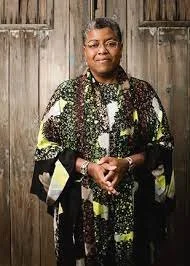Judy A. Rose, composer of life | Humans of Catlin Gabel
By Tia Chakrapani ‘27
Image by Renaissance Ensemble.
Catlin Gabel Music Teacher Judy Rose
As a young girl, Judy A. Rose sat in the audience of a production of The Nutcracker. Despite impressive orchestra serenades, graceful ballerinas, and scary mice, Rose could only focus on one person—the conductor. At that moment she knew what she wanted to be.
Rose is currently a music teacher at Catlin Gabel School. She is the choir director, leads the rock band, and teaches many other elective art courses such as songwriting.
Rose was born in West Virginia. She has nostalgic memories of listening to and singing gospel music with her church. When she was 5 years old, she was adopted by a single white woman and moved to La Grande, Oregon.
Her mother loved music and exposed Rose to the arts at a young age. It was their trip to the Nutcracker that shaped her future. “The Nutcracker, that changed my life,” said Rose.
She was mesmerized by the conductor’s ability to command the orchestra with the rising and falling of his hands. At that moment, she developed a passion for Tchaikovsky. She still finds solace in his music.
“I love Tchaikovsky, just like straight up… I don't know what I felt, just magical,” said Rose.
Her mother is a classical pianist and tried to teach her to play, but Rose took a more unconventional approach.
“I just wanted to figure songs out on my own, which I did a lot of…you know by ear,” said Rose. Rose struggled to read music and focus at practice. Luckily, she was able to learn music by tinkering and using her ear. She was able to decode music without having to read sheet music. She would later find out that she had perfect pitch, which means the ability to recognize the pitch of a note or produce any given note.
Rose’s zeal for music evolved not just as a hobby, but as a refuge—a sanctuary where she could freely express herself amidst an often cruel world.
Rose is an African American woman who spent her formative years in a rural community in Oregon. She states, “Then we moved to La Grande, and that just kind of devastated my whole planet…that community at the time was pretty white and pretty racist,” said Rose.
One unfortunate experience she had was the time she tried out for the basketball team and didn’t get chosen.
Rose was a talented athlete and played a variety of sports, mainly basketball but also volleyball and soccer. She was one of the fastest girls who tried out for the team.
“When I didn't make the team, I was really depressed. But the boy’s coach came in and said to me, in not so few words, one of the reasons you didn't get on the team is that the coach said that he doesn't want to have a black girl,” said Rose.
Although disheartening, this act of racism may have propelled her into music. Basketball was no longer an option. Fortunately, the choir director noticed her perfect pitch and recruited her to be a part of the choir and try out for the school musical. She began to flourish and was offered many leadership roles like conducting the choir as a high school student.
This was a journey she continued in college. She was admitted to the Berklee College of Music, in Boston Massachusetts, but she did not have the money for tuition. Instead, she attended Treasure Valley Community College and eventually ended up at Portland State University (PSU).
While studying, she had to work two jobs. She called it her “20-year plan,” as it took longer than usual to finish college while working simultaneously.
During her education, she sought more diversity. She wanted to find more people of color and thought that PSU would provide that, but it did not. Rose states, “There should be a lot more brown people in the music department. And there weren't. Like, surprise! You know, so there was one jazz professor there when I was there.”
Rose wanted to be a conductor. However, it was difficult to break into the music industry. As a way to keep connected to music, she started teaching in the Portland Public Schools. She did this for 20 years. “Teaching was not like my first [choice]… I just wanted to be a conductor and you know, and compose and all that,” stated Rose.
During this time, Rose satisfied her urge to compose by arranging pieces for her student choir. She finally achieved her goal of becoming a published composer with her first piece My Lord Good Lord.
Her second published piece I’ve Found Me a River received numerous accolades and premiered by the Portland Symphonic Choir.
Rose received the 2019 GAP Award for I’ve Found Me a River. It gave her the funding to create a CD recording of her original choral spiritual.
Rose was moved to write this piece after the police shot Charles Kinsey. He was a black therapist who was helping an autistic boy who had wandered from his group home. This incident inspired Rose to reflect on racial trauma and write this spiritual piece.
Rose was always musically gifted with her perfect pitch, but the journey of being recognized for her music was long and arduous. She said the music industry is unforgiving. Many of her pieces were rejected and criticized with red ink.
“So my advice is keep going, take in the feedback even though it hurts, and just keep going,” said Rose.
Rose’s story is an inspiration to all of us. It's like a beautiful melody, keep playing, keep singing, and always keep going.

